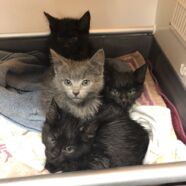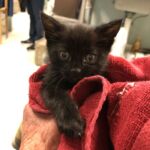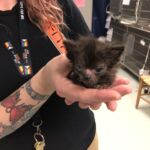Purrrrrr: How Saving Abandoned Kittens Saved Me from My Worrywart Brain
My work with abandoned neonate kittens began a couple of years ago when I saw a story in our local paper asking for volunteers. I love animals and had a romantic idea that feeding bottles to baby kittens who’d lost their mothers would be great fun. I had no idea what I was getting into. I trained and trained, both as a volunteer at the city shelter and more specifically as a carer for “the babies,” as they are called. When I “graduated,” I was thrown head-on into complicated tasks of keeping these tiny creatures alive. It wasn’t romantic. It was work.
Which suited me just fine, actually. I’m a worker and a worrier, by no means the relaxing sort. In fact, not working fills me with anxiety. When I retired from teaching, friends who knew me well asked me what I was going to do with myself. Wouldn’t I miss the hustle and bustle, the students, the seasonal rhythms of academic life?
Well, not much. I enjoyed my students—most of them—but the daily grind of preparing and teaching classes (one of my maladies being performance anxiety) and grading papers and going to what seemed like endless meetings was starting to get to me after thirty-plus years of doing it, along with trying to squeeze in my own work on weekends and over the summer and occasional sabbaticals.
Now, I tell people, I have a different relationship to time.
I have time to write my novels and take care of everything else that goes along with that work. All this keeps me busy. Paradoxically the writing itself can be relaxing while at the same time laborious. An insomniac, I sleep well when I am writing; I am deeply tired at the end of the day. If I do stay awake, it’s because I’m musing about whether this character would do that, or that character would do this. Or I may be wondering whether I’ve captured the essence of a particular place, or what particular twist or turn will come next in my story (this one does make me anxious, plotting not being my strong point). While being very much inside my own head in the creative process, I’m also outside myself and the stuff that makes up our everyday lives: Have I paid the water bill? Does the dog need walking? What about that pile of laundry? What can I cook for dinner without having to go to the store?
A scientific fact: The brain cannot think about two things at once. Anything that takes me out of my own worrywart monkey brain can be relaxing, whatever it may be. It’s like taking a vacation from yourself, your own little life, the horrors in the Middle East, the political mess we’re in, and so on and so on. I worry about all of these things, I give money to help, I send up my kind of prayers to a universe beyond my understanding. I march in protests. Other things I anguish over: a friend with cancer, one with Alzheimer’s, my own selfish concerns. (Will my agent like my new manuscript? Will an upcoming book tour go well? Will my cranky back hold up to the air travel this time around? Will I falter in a talk or reading or interview—again the old performance anxiety rearing its ugly head?)
I try to relax, really I do. I walk the dog, I take a Spanish class, I read, I cook, I grow tomatoes, I have fun with friends and with my partner. It all helps.
But nothing relaxes me more than my volunteer work in the city animal shelter neonate nursery. Here I bottle-feed orphaned kittens I can hold in the palm of my hand. The newborns’ little threads of umbilical cord are still attached. Many have little fur and skinny rattails. Their ears are flat to their heads, their eyes bulge. They are toothless. You can feel their tiny ribs and backbones if they’ve been abandoned for a few days. They scream bloody murder when they’re hungry, which can be overwhelming when there are a dozen or so to take care of. They are cacophonous in their need for food, food, food; their lives are in your hands. This may not sound exactly relaxing; the work is and must be careful and precise. Your care is literally their survival. They are fierce in their need for nourishment and delicate as tissue paper. They must be weighed every morning to ensure that they are eating enough. Their intake is monitored in milliliters.
On my volunteer days, I can think of nothing but mixing formula in exact proportions (one scoop of powder to two scoops of warm water), loading a bottle or syringe, attaching the nipple properly so it doesn’t fall off, gently lifting a screaming kitten to feed. Some of these babies have a strong sucking instinct; others you have to dribble a little bit of the liquid into the side of their mouths and let them swallow each drop before dribbling more. Too much can cause asphyxiation; too little, malnourishment.
Our city shelter has put significant resources into the kitten nursery. There are four incubators (temperature to be set at 87 degrees and 45–50 percent humidity) and five cages. Litters are kept together and fed together. For this, the volunteers wear gowns and gloves, one set for each litter, to prevent the spread of infections—baby kittens are very susceptible to disease. There are upper respiration and urinary tract infections, which can kill a kitten overnight. There is something called Panleukopenia, the cat equivalent of Parvo in dogs, and these kittens are euthanized. There is ringworm, in which case the kittens are put into isolation. When a litter departs an incubator or cage, the whole thing has to be sterilized and the towels and toys have to be washed.
Each kitten has a name. Litters of kittens can have crazy but related names, like Eggs, Bacon, Toast, and Jam. Like Snow White’s seven dwarfs.
Some die and we mourn them. One little black kitten—I’ll call him “Joey”—came to us as a newborn. His legs were pink twigs and his fur was patchy. His face was puckered as if he were overwhelmed by worry, like me in my worst moments. And yet Joey had this powerful life force in his odd little malnourished body; he screamed for food and sucked his bottle frantically. He stole everyone’s hearts and we took care of him for weeks. He grew and thrived. We had to transport him to our local emergency vet each night because no one volunteered to foster him. Finally a vet tech at the clinic stepped up, and we all breathed a sigh of relief. Several days later, I learned that Joey had died. “Don’t tell the other volunteers,” said my supervisor. “It’ll just upset them.”
Why Joey? Who knows? His death broke my heart because I’d wanted to bring him home but was heading out on book tour. I think I could have saved him.
Maybe. There are so many hazards to raising these tiny ones. They must be fed every three to four hours night and day or they will die. You cannot feed a cold kitten; its whole digestive system freezes up and it will die. A kitten whose canines have come in can’t be fed with a nipple; the kitten will bit it off and swallow it, blocking its intestines and it too will die. A kitten must be stimulated to urinate and defecate—normally the mother cat’s job—or it too will die.
I’ve never had a kitten die in my hands, but several of my volunteer friends have. We all mourn the ones who don’t make it.
After several weeks, newborns are moved from incubators into cages and fed bowls of mush, which is its own precise combination of formula and canned cat food. They become clowns, traipsing about in their bowls, slathering themselves in mush; they must be bathed, sometimes daily, in a particular kind of shampoo, taking care that they are well dried and don’t get too cold. When they reach two pounds, they can be neutered or spayed, and then, at long last, put up for adoption.
Whew! It’s anybody’s guess as to why I find all this relaxing. Sure, there’s joy and a sense of accomplishment to see a kitten you’ve cared for on the shelter’s weekly adoptions list. Sure, there’s the old adage of “giving back to the community” and the sense of comradery with other volunteers. But raising orphaned kittens is more than giving back or experiencing moments of joy or satisfaction. And let’s be real: I could be doing more to give back than bottle-feeding baby kittens—much more.
And yet.
Little Joey could purr like nobody’s business when he had taken his fill of formula. It was the loudest purr of any kitten—or cat—I’ve ever heard. Like the whinny of a horse, the scream of a peacock, the gargle of a migrating crane, the feline purr is a unique sound. Joey’s purr was more than a sound, though: His whole tiny vulnerable body throbbed with it. I felt that purr in my body too; I felt it slow my heartbeat, as if it too were purring.
Nothing in my long life has ever relaxed me more. In fact, relaxation is too weak a word. Nothing has ever brought me closer to a world outside my own fool self—a world that literally purred a peace that, despite all, I could live within, if only for a fleeting moment.










Oh, Minrose. I loved this. Sooner or later, we all go looking for a world outside our own fool selves. I like the sound of yours a lot.